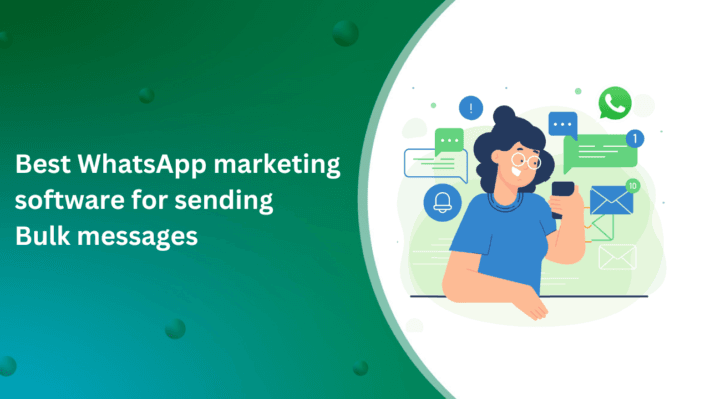WhatsApp Automation Tools: Features, Benefits & Uses
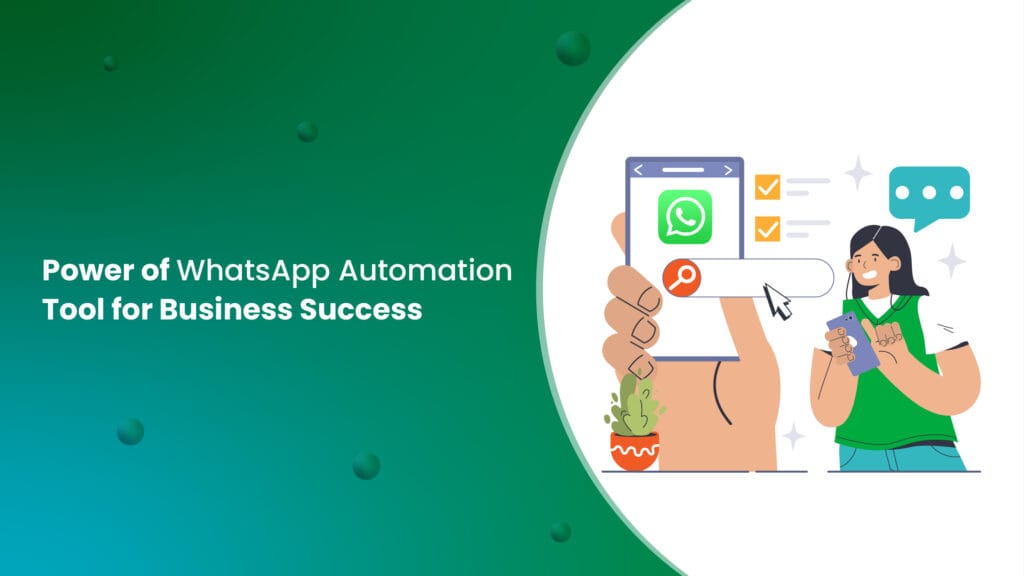
WhatsApp app has over two billion users worldwide. Your customers are probably already using it, so why not make it work for your business?
Whatsapp messaging app Automate your WhatsApp messages, save time, cut costs, and improve your customer experience. It’s easy to set up and doesn’t require hiring extra staff.
So, Let’s dive into the details!
Here’s the biggest Doubt—
Can you automate WhatsApp messages?
Yes, you can. But first, let’s find out what WhatsApp automations are.
What is WhatsApp Automation?
WhatsApp automation is the process of using software or tools to automatically send messages, respond to customer queries, and manage conversations on WhatsApp. It allows businesses to handle repetitive tasks without the need for manual intervention, saving time and improving efficiency.
Think of it as having a virtual assistant on WhatsApp. Instead of you or your team replying to every message or sending notifications one by one, automation tools take care of these tasks. From sending welcome messages to answering common customer questions, WhatsApp automation simplifies communication for businesses.
But the question is How Does WhatsApp Automation Work?
WhatsApp automation works through third-party platforms that integrate with the WhatsApp API (Application Programming Interface). This setup allows businesses to automate communication, making it faster, more efficient, and convenient. Here’s how it works in detail:
- Chatbots for Quick Conversations:
Chatbots are automated tools that handle customer inquiries in real time. For example, if a customer asks, “What are your business hours?” The chatbot instantly replies with pre-set information like, “We are open from 9 AM to 6 PM, Monday to Friday.” This reduces the workload on customer service teams while ensuring fast responses to common questions. - Automated Notifications and Updates:
Businesses can send automatic updates such as order confirmations, shipping details, and appointment reminders. For instance, when an order is shipped, the system triggers a message like, “Your order #12345 has been shipped! Track it here: [link].” These timely updates improve customer satisfaction and reduce repetitive queries. - Trigger-Based Responses:
Specific customer actions, like typing a keyword or abandoning a cart, can trigger automated messages. For example, if a customer types “pricing,” they receive a message with pricing details. Similarly, abandoned carts can trigger reminders like, “Hi! You left items in your cart. Complete your purchase now and get 10% off!” - Quick Replies for FAQs:
FAQs, such as “Do you offer free shipping?” can be automated. The system instantly replies with answers like, “Yes, free shipping is available on orders over $50!” This saves time for both customers and support teams. - Message Scheduling:
Businesses can schedule messages, such as promotional campaigns or follow-ups, to be sent at specific times. For example, a business can send a message like, “Don’t miss our weekend sale! Enjoy 20% off. Shop now: [link],” at the perfect moment to catch customer attention. - Workflow Automation:
WhatsApp automation organizes repetitive tasks, such as routing complex queries to live agents or sending follow-up messages. For instance, if a customer types “Talk to support,” the system directs their message to a human agent immediately. - Personalized Customer Engagement:
Automation tools can send messages tailored to individual customers using their name, purchase history, or preferences. For example, “Hi [Name], thanks for buying [Product]! Let us know if you need help.” This personal touch helps build stronger relationships.
Now, let’s see it in action.
Top Ways to Use WhatsApp Automation
Here are some ideas to get started:
1. Send WhatsApp Greeting Messages
Greeting messages are a key part of making a good first impression on customers. With WhatsApp automation, businesses can send personalized welcome messages to customers automatically. This helps acknowledge their interaction right away, making them feel valued and engaged without the need for manual input from the team.
Here’s an example of this message from Fresh & Hearty:
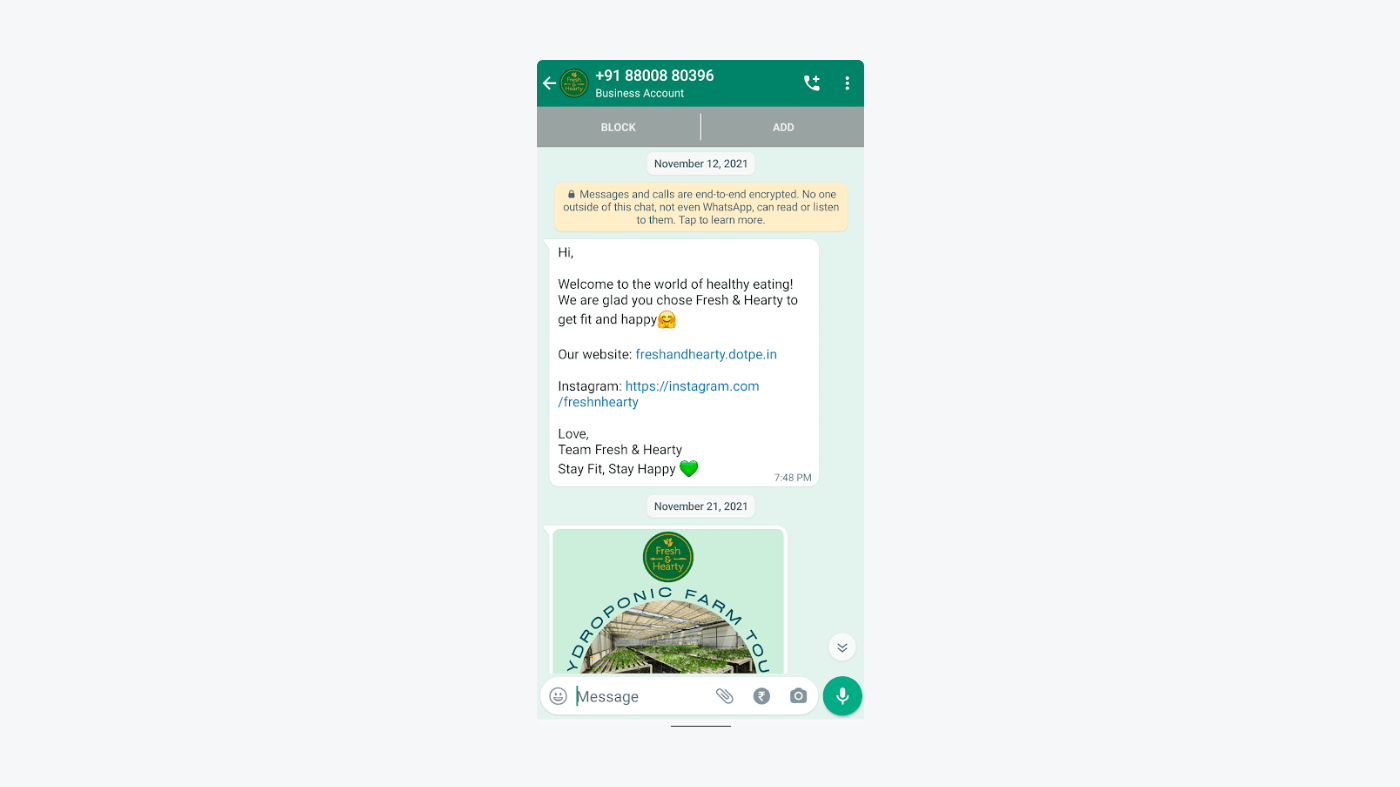
2. Leverage WhatsApp Marketing Automation
WhatsApp marketing automation is a powerful tool for businesses to reach out to customers directly. Automated WhatsApp messages can be used to send marketing materials such as promotional offers, discounts, and product updates to customers. This direct approach increases visibility for the business and helps drive engagement, as customers are likely to open and view messages they receive on WhatsApp.
Here’s how Deyga Organics uses WhatsApp automated messages to spread the word about their discount:
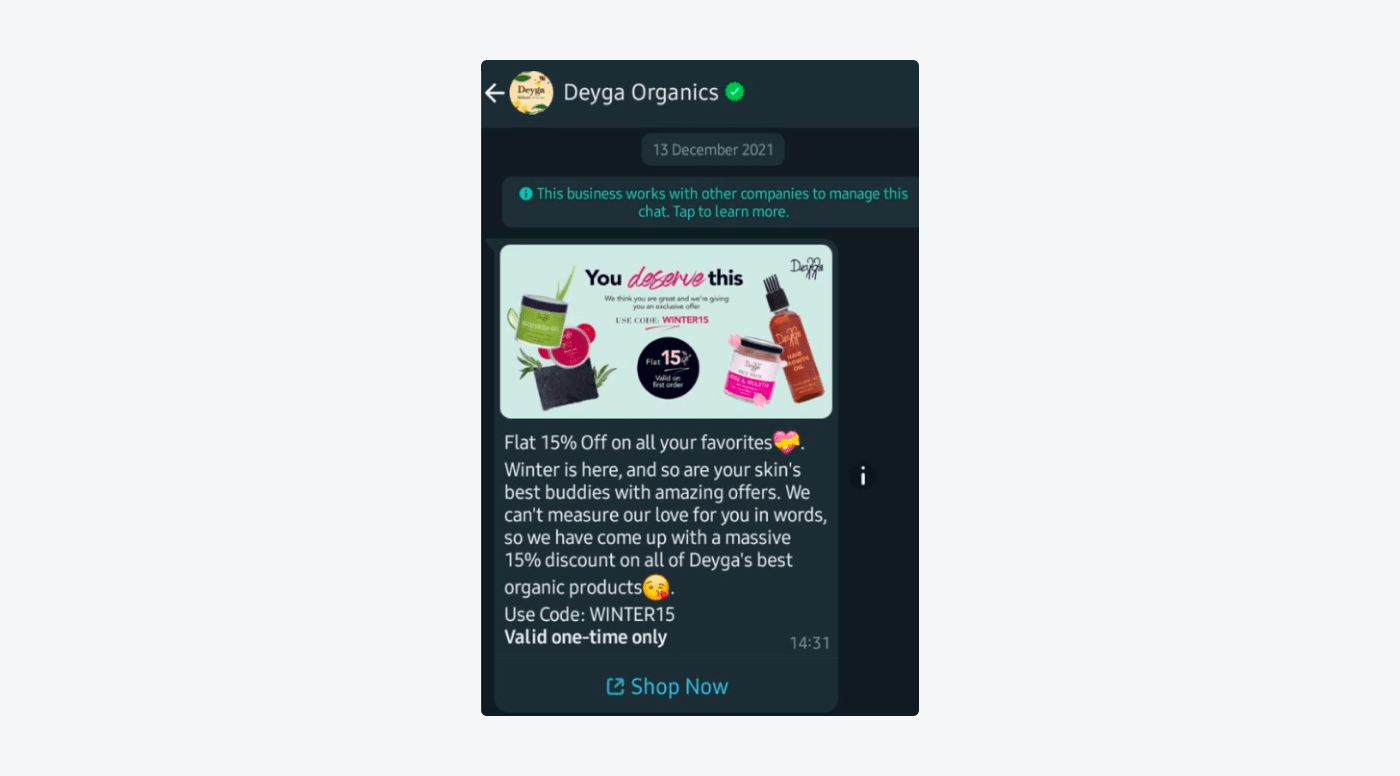
3. Provide Instant Checkouts
WhatsApp automation can streamline the checkout process for businesses. Instead of customers having to navigate through lengthy online checkout forms or websites, they can complete their purchases directly through WhatsApp. By integrating payment systems with the platform, businesses can provide a seamless, instant checkout experience, which can improve customer satisfaction and drive sales. The convenience of completing a purchase through a simple message also reduces cart abandonment rates.
Here’s how it looks:
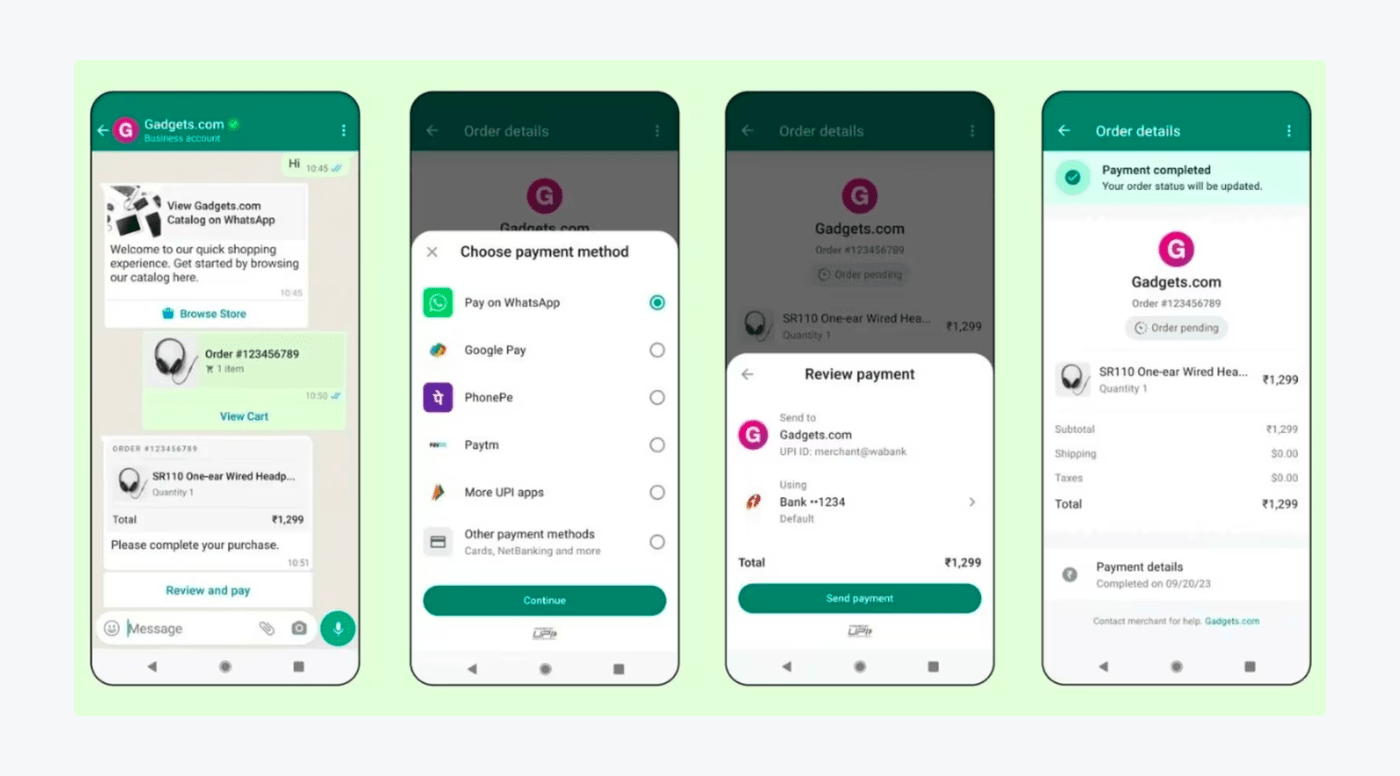
Did you know that…🤔
“A survey by UiPath revealed that businesses can save an average of $1.5 million annually by automating their processes. With WhatsApp automation software, companies can cut down on manual tasks, eliminate the need for physical infrastructure, and make better use of their resources.”
4. Send Appointment Reminders to Customers
Appointment reminders are critical to ensuring customers show up for their scheduled times. With WhatsApp automation, businesses can send automated reminders ahead of time, helping reduce the chances of missed appointments. These messages can be customized and timed appropriately to ensure customers are reminded in advance, improving attendance rates and keeping the schedule organized.
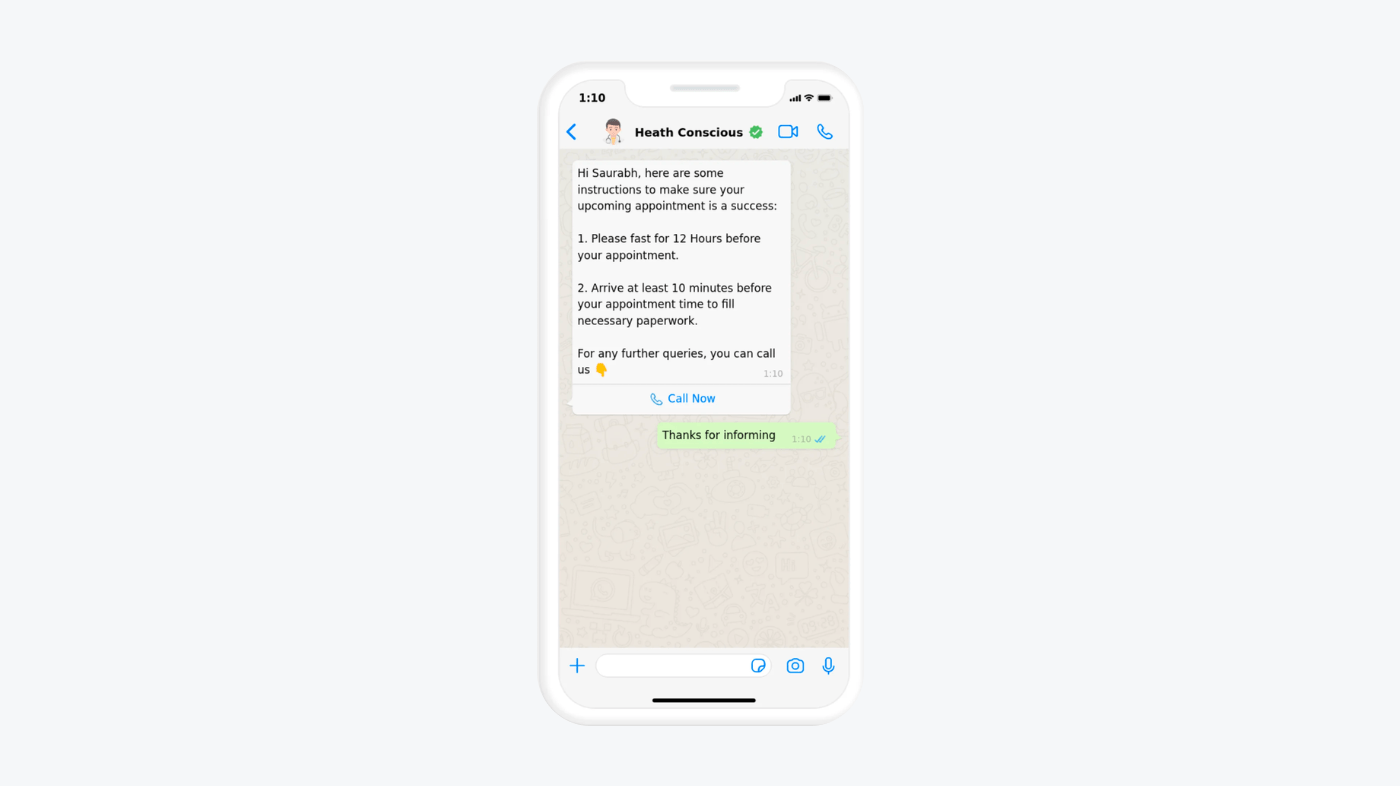
5. Enable Scheduling of Meetings
Scheduling meetings can be a time-consuming task for both businesses and customers. WhatsApp automation allows businesses to simplify this process. Customers can book appointments or meetings through an automated message flow, selecting available time slots that fit their schedule. This system helps eliminate the need for back-and-forth communication to find a suitable time, making the booking process more efficient for both parties.
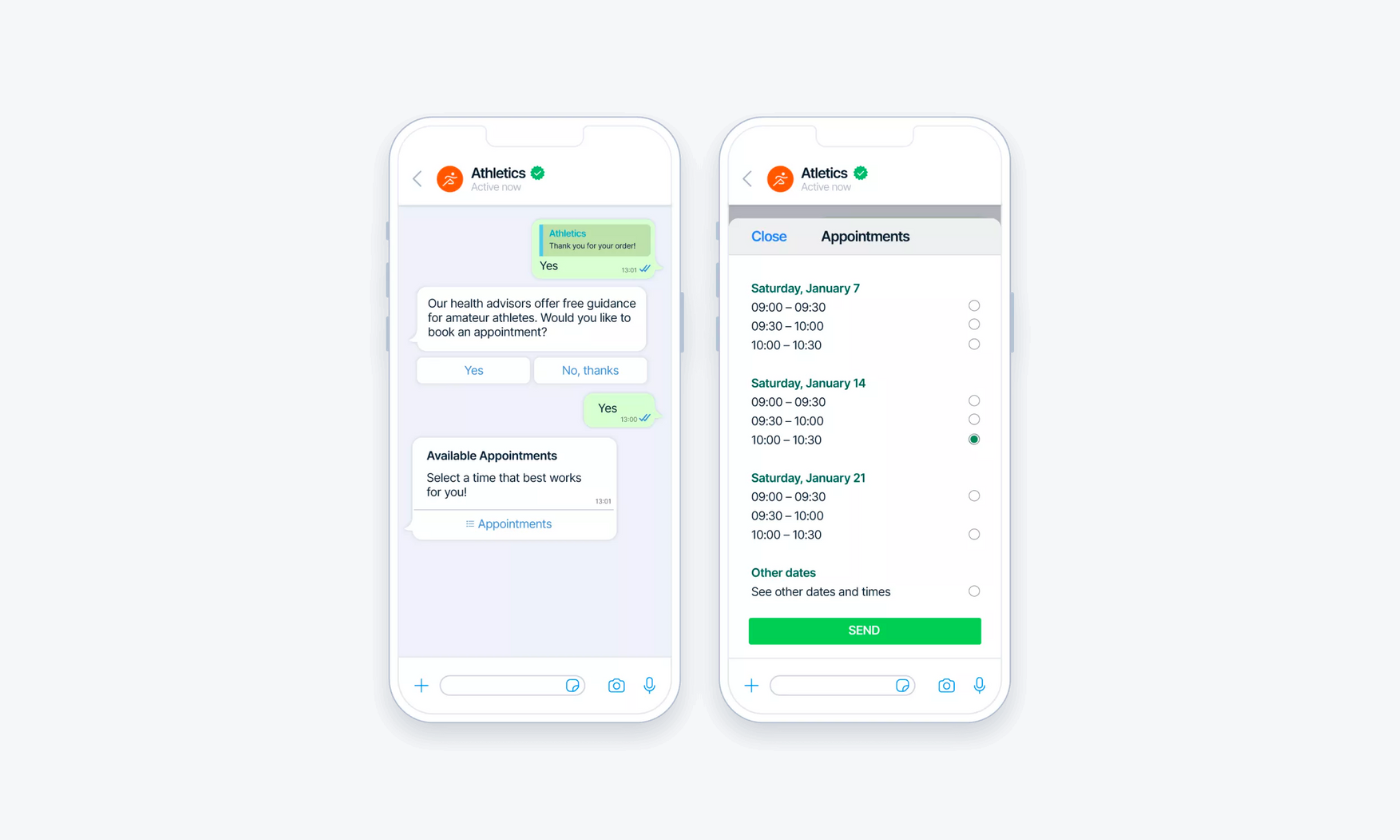
6. Set Up a Support Questions Responder
Many customers have common questions that they ask repeatedly. WhatsApp automation allows businesses to set up automated responses to these frequently asked questions (FAQs). This helps customers get instant answers to their queries without waiting for a live agent. Automation tools can also forward more complex issues to human agents while handling simpler inquiries, ensuring that the overall support process is more efficient and timely.
Check out how Freedom mobile uses these WhatsApp automatic messages:
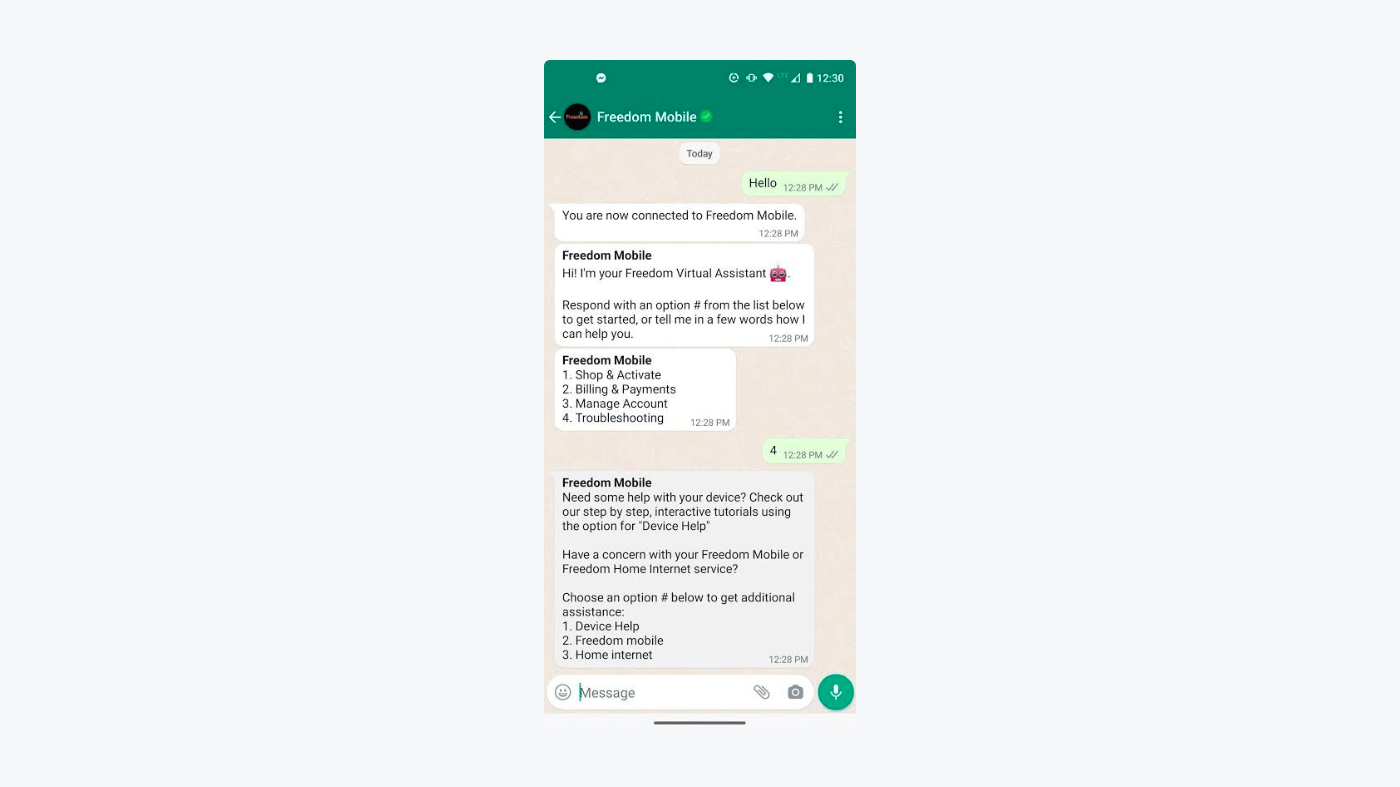
Okay—
But how to make this automatic WhatsApp messaging?
Let’s find out.
How to Automate WhatsApp Messages
To automate WhatsApp for your small or large e-commerce business, the first step is to choose a tool that suits your business needs. With SalesTown, you can easily set up WhatsApp automation and enhance your customer engagement and support system.
Before you start, make sure to open a WhatsApp Business account, as this is required to set up WhatsApp Business automation with SalesTown.
Once your account is ready, follow these simple steps to get started with WhatsApp automation using SalesTown:
Step 1: Log in to Your SalesTown Account
- Create an Account: If you don’t have a SalesTown account yet, start by signing up on the platform. It’s easy and only takes a few minutes to get started.
- Log in to Your Dashboard: Once your account is set up, log in to your SalesTown dashboard. The dashboard will be the central place where you manage all your automation, including WhatsApp messages, customer interactions, and analytics.
Step 2: Integrate WhatsApp with SalesTown
- Connect WhatsApp Business Account: The first thing you need to do is connect your WhatsApp Business account to SalesTown. This is done through the WhatsApp Business API.
- Go to the ‘Integrations’ section in SalesTown.
- Follow the step-by-step instructions to link your WhatsApp Business account with SalesTown. You’ll need to provide the phone number associated with your WhatsApp Business account during the setup.
- Set Up API Access: SalesTown will guide you through the process of setting up API access, which enables the communication between your WhatsApp account and SalesTown’s platform. Once integrated, SalesTown will be able to send and receive WhatsApp messages on your behalf.
Step 3: Set Up Automated Messages
- Automated Greetings: You can now create automated greeting messages for customers who reach out to you via WhatsApp. Greeting messages help set a positive tone right from the start, making customers feel welcome and valued. For example, when someone contacts you for the first time, an automatic greeting message will be sent to acknowledge their inquiry.
- Create Responses for Frequently Asked Questions (FAQs): Use SalesTown’s chatbot builder to create automated responses for commonly asked questions (e.g., store hours, return policies, or product details). This saves time and ensures customers receive instant replies.
- Marketing Campaigns: Set up promotional messages to notify customers about sales, discounts, new product launches, and more. Automating these messages means you won’t have to manually send out each promotional update, and your customers will stay informed in real time.
- Appointment and Event Reminders: Schedule reminders for upcoming appointments, events, or meetings. This helps reduce no-shows and ensures customers stay informed about important dates.
Step 4: Create Triggers and Workflows
- Define Triggers: Triggers are events or actions that initiate automated messages. For example, you can set a trigger to automatically send a message when a customer asks about a particular product, clicks on a link, or makes a purchase. SalesTown makes it easy to set triggers using simple rules and conditions.
- Set Up Workflows: Workflows are sequences of messages or actions that occur after a trigger is activated. For instance, if a customer inquires about a product, you can set up a workflow that sends a product description followed by a discount offer or a link to purchase. SalesTown allows you to customize these workflows to suit your business goals.
- Segmentation for Targeted Automation: You can segment your customers based on criteria such as purchase history, location, or behavior, and create personalized automation for each segment. This ensures that your customers receive the right message at the right time.
Step 5: Test Your Automation
- Testing the System: Before launching your WhatsApp automation, it’s important to test everything to ensure the system works smoothly. Send test messages, interact with the automated responses, and check if the triggers and workflows are functioning as expected.
- Identify and Fix Issues: If you notice any issues during the test phase (e.g., incorrect messages being sent, delayed responses, or technical glitches), make the necessary adjustments to fix them. This ensures your customers have a seamless experience when interacting with your automated WhatsApp system.
- Test User Scenarios: Try different user scenarios to ensure the system responds correctly to various types of interactions. This will help you identify any potential issues in the customer journey.
Step 6: Launch and Monitor
- Go Live with Your WhatsApp Automation: Once you’re confident that everything is working correctly, you can officially launch your WhatsApp automation. From this point on, SalesTown will handle automated responses and tasks, freeing up your team to focus on other important business areas.
- Monitor and Analyze Performance: After launching your automation, use SalesTown’s analytics tools to track the performance of your WhatsApp messages. You’ll be able to see how many messages were sent, how many customers engaged with the automation, and whether your goals are being met.
- Optimize for Better Results: Based on the data and feedback you receive, you can adjust and optimize your automated messages and workflows for even better performance. For instance, you might tweak your greeting messages to make them more engaging or adjust your marketing campaigns to increase conversions.
Now—
What are the top WhatsApp automation software that you can use for your business? Let’s check them out.
Best Tools for WhatsApp Automation
These tools are designed to streamline your WhatsApp marketing, improve business communication, assist with follow-ups, and simplify the onboarding process for new customers. WhatsApp automation can also support your sales team by helping move clients through the sales funnel more efficiently.
However, to achieve these benefits, it’s important to select the right software that fits your business goals. Here are our top 5 picks:
Platform | Rating | Free plan/trial | Best for |
4.7/5 ⭐️ | ✅ | Automation | |
4.7/5 ⭐️ | ✅ | AI automation | |
4.6/5 ⭐️ | ✅ | Performance monitoring | |
4.7/5 ⭐️ | ✅ | Marketing campaigns |
Let’s check out each of these tools one by one.
SalesTown
SalesTown is an all-in-one customer experience platform that integrates WhatsApp automation with your business operations. It helps with marketing automation, customer support, follow-ups, and even sales.
- Key Features:
- Chatbots for automated customer interactions.
- No-code chatbot builder to customize responses.
- Live chat software to manage conversations in real-time.
- Email marketing integration to manage customer engagement across multiple channels.
- Push notifications to keep customers informed.
- Why Choose SalesTown: SalesTown is ideal for businesses that need a versatile platform that combines WhatsApp automation with other marketing and communication tools. It’s perfect for automating customer interactions while providing real-time support when needed.
2. Tidio
Tidio is a popular tool for customer communication and automation, mainly known for live chat and chatbots. It can also work with WhatsApp by using third-party tools or APIs to add automation features.
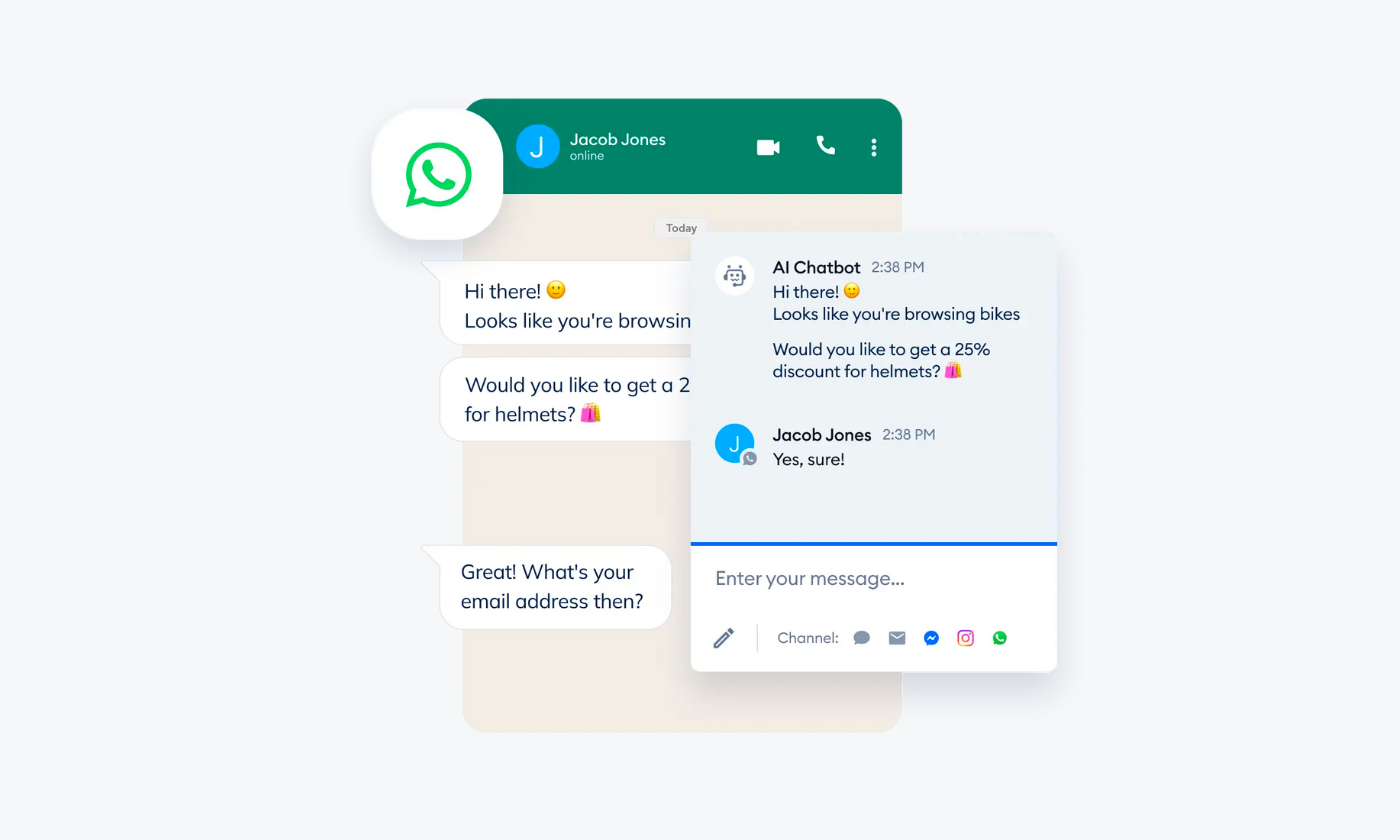
- Key Features:
- AI-powered chatbots to answer customer queries instantly.
- Automated messaging to send greetings, follow-ups, and promotional offers.
- Live chat integration for real-time conversations.
- Multichannel support allows communication via WhatsApp, email, and Messenger.
- Why Choose Tidio: Tidio is a great option for small to medium-sized businesses looking for a simple solution to manage customer communication and automate repetitive tasks. It’s quick to set up and easy to use, making it a great choice for businesses just starting with automation.
3. WATI
WATI (WhatsApp Team Inbox) is a WhatsApp Business API solution designed for teams to manage customer inquiries and automate workflows. It offers a range of features to improve customer engagement, streamline communication, and monitor team performance.
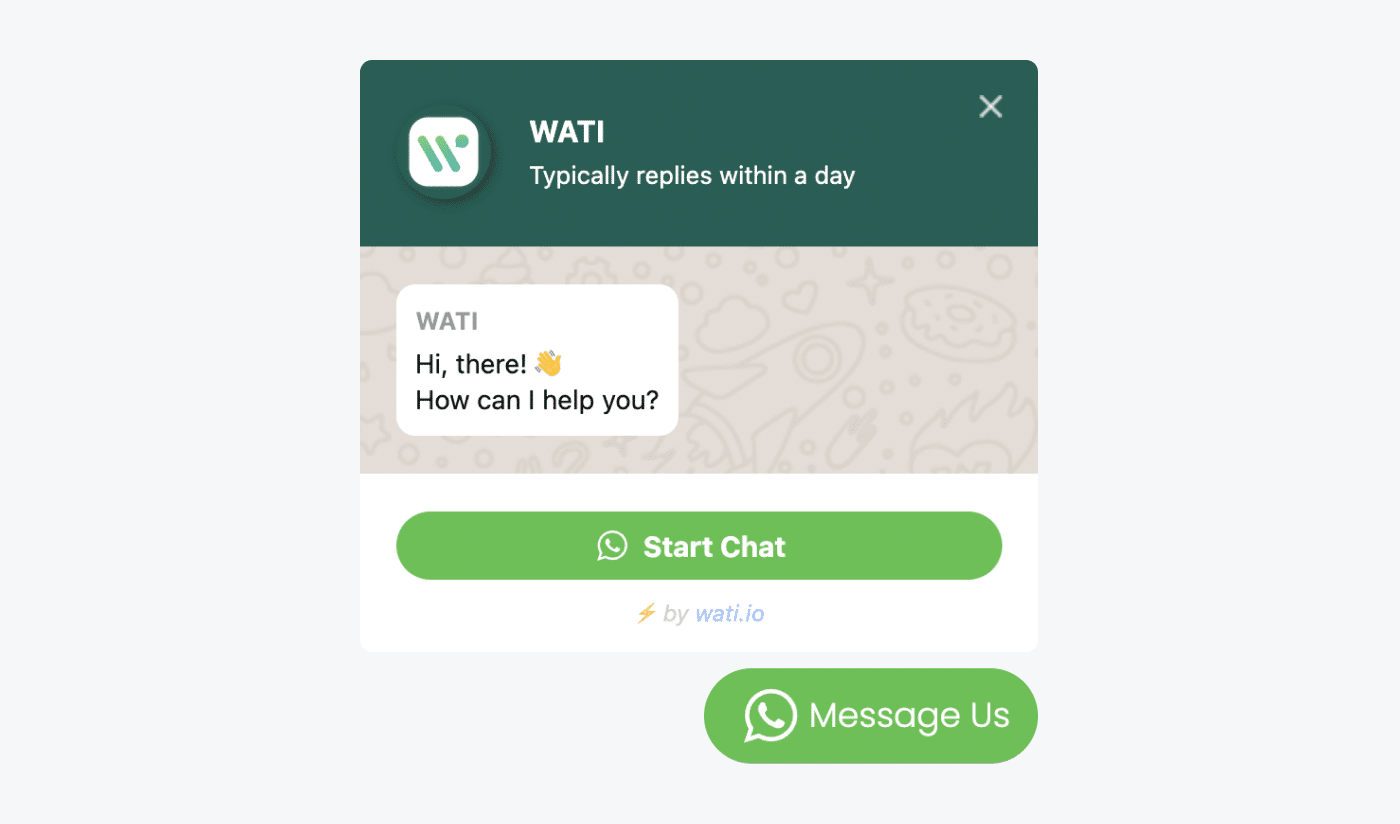
- Key Features:
- Official WhatsApp Business API integration for seamless communication.
- Automation workflows for lead generation, customer support, and follow-ups.
- Team collaboration tools to assign and track customer queries.
- Performance monitoring to track metrics like response time and message volume.
- Why Choose WATI: WATI is perfect for businesses that need a collaborative platform for their customer support team. It’s an ideal choice for businesses that have a larger customer base and need a more structured system to handle customer communication and automate responses.
4. Landbot
Landbot is a conversational platform that allows businesses to create engaging WhatsApp chatbots for automating communication. It’s especially useful for creating customized conversational experiences, collecting customer data, and nurturing leads.
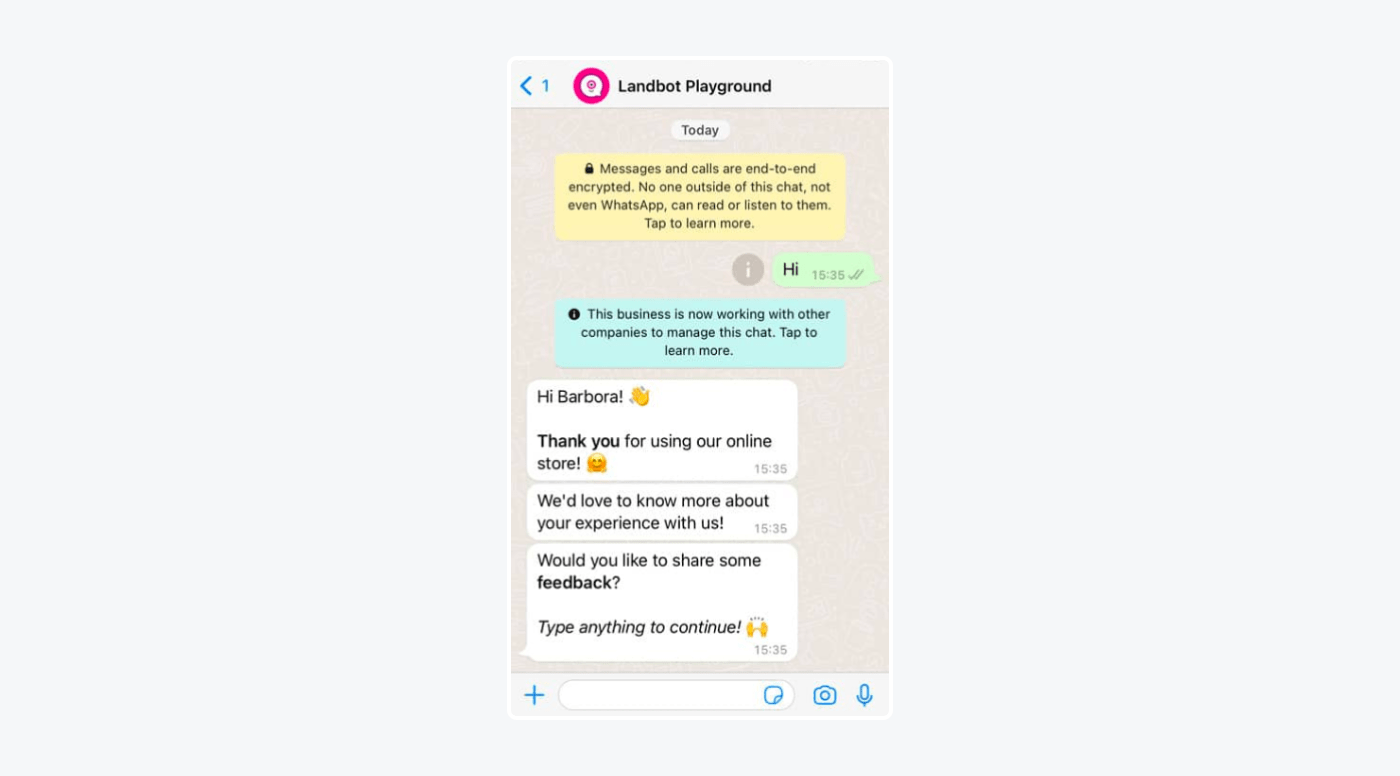
- Key Features:
- Drag-and-drop chatbot builder for creating personalized WhatsApp bots.
- Customizable workflows to guide customers through different processes.
- Integration with CRM systems like HubSpot and Salesforce to sync customer data.
- Analytics and reporting to monitor chatbot performance and optimize conversations.
- Why Choose Landbot: If you’re looking for highly customizable WhatsApp automation with a focus on creating unique customer journeys, Landbot is the tool for you. It’s perfect for businesses that want to design interactive and engaging automated experiences.
5. Zoko
Zoko is an all-in-one platform for WhatsApp marketing and customer engagement. It helps businesses automate WhatsApp messages, manage customer conversations, and integrate with e-commerce platforms to enhance the customer experience.

- Key Features:
- Automated WhatsApp messaging for customer engagement, orders, and promotions.
- E-commerce integrations with Shopify, WooCommerce, and other platforms.
- Broadcasting features for sending bulk messages, promotions, and updates.
- Rich media support for sending images, videos, and documents via WhatsApp.
- Why Choose Zoko: Zoko is ideal for e-commerce businesses that want to integrate WhatsApp with their sales and marketing strategies. It simplifies the process of communicating with customers and driving sales directly through WhatsApp.
Conclusion:
Choosing the right WhatsApp automation tool depends on your business’s specific needs. Whether you’re looking for a versatile platform like SalesTown, a simple and user-friendly tool like Tidio, or a more advanced solution like WATI or Landbot, there’s an option for every business. Make sure to evaluate your business requirements and pick the tool that best fits your workflow and customer engagement goals.
Ready to get started with SalesTown whatsapp automation tool that fits your needs and start automating today.
Frequently Asked Questions (FAQ)
Q1: What are WhatsApp automation tools?
WhatsApp automation tools help businesses streamline communication by automating tasks like sending messages, setting up auto-replies, and managing customer interactions. These tools save time, improve efficiency, and ensure consistent communication with clients, enhancing customer experience.
Q2: What are the benefits of WhatsApp automation?
WhatsApp automation saves time by handling repetitive tasks like auto-replies, bulk messaging, and customer support. It improves efficiency, enhances customer engagement, and ensures consistent communication. Automation also helps manage large volumes of messages and streamline business processes effectively.
Q3: Are WhatsApp automation tools free?
Some basic WhatsApp automation tools are free, offering limited features like auto-replies and bulk messaging. However, for advanced functionality and better performance, paid versions are recommended. These provide more features, better customization, and ensure compliance with WhatsApp policies.
Q4: How do WhatsApp automation tools work?
WhatsApp automation tools work by integrating with your WhatsApp Business account to automate tasks like sending messages, setting auto-replies, and managing customer interactions. These tools use predefined workflows to handle repetitive tasks, ensuring efficient and seamless communication.
Q5: Can WhatsApp automation handle customer support?
Yes, WhatsApp automation can handle customer support by providing instant responses, managing queries, and resolving issues efficiently. It simplifies communication, allowing businesses to offer quick and reliable support, ensuring a better customer experience.

